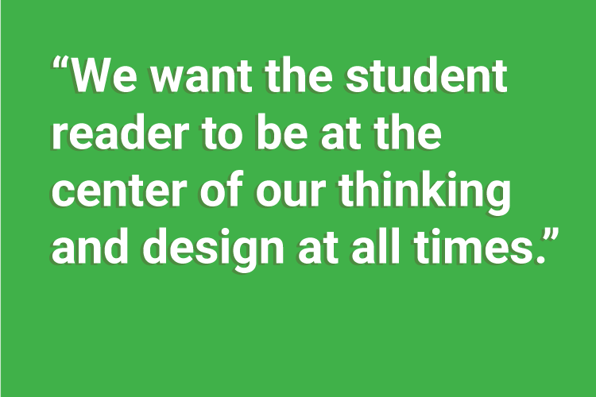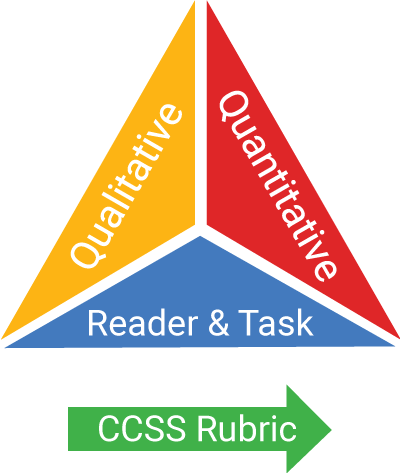
Building Knowledge and Skills in a Meaningful Sequence
ThinkCERCA is based on best research-based practices and designed for blended delivery. Our suggested scope and sequence is designed to build a meaningful continuum of knowledge in content areas, while introducing increasingly complex key skills and concepts.
Continuum from Grades 3-12
As students work through ThinkCERCA’s curriculum, they grow their base of knowledge from familiar to more complex topics, texts, and tasks. Lessons are provided in four subjects with cross-curricular and cross-genre connections through themes and topics. The sequence is designed to explicitly build connections from informational texts where abstract vocabulary is introduced to literature where that abstract vocabulary can be applied in analysis. The texts and tasks increase in complexity through the sequence.
For example, a student will read an informational text about the brain chemistry involved in risk-taking and explain the importance of risk taking. They then extend their knowledge of that theme by reading a short work of literature about a character taking a risk and analyze whether or not the risk was worth taking for the character.
Therefore, students are applying practice in meaningful service of understanding and appreciating texts. Through the year, students develop the abstract conceptual understanding, close reading skills, and vocabulary to achieve higher order thinking and construct deeper knowledge together.
While skills are practiced throughout the year, there are explicit opportunities to introduce them within the meaningful context of applied lesson sets, in which a focus on a particular skill or concept yields additional delight or understanding within a particular text. The skills are not taught in isolation, nor are they the sole purpose of the set. Instead, ThinkCERCA’s curriculum design ensures students are introduced to these key concepts and vocabularies in a recommended continuum and layered in an equally scaffolded continuum of knowledge in core content areas. Together the skills and knowledge continuums are inextricably bound in a rich but flexible curriculum for supplemental or core use, with the addition of longer works of fiction and nonfiction.
To support students in building their knowledge of topics and skills, we choose rich, engaging, authentic texts as the basis for each lesson, and we carefully consider multiple factors in regard to each text: quantitative, qualitative, and factors related to the reader and task. This approach mirrors the one described and supported in the Common Core State Standards.

We take into account multiple, widely accepted industry standards for quantitative complexity, including CCSS grade level ranges, and also analyze other qualitative aspects of a text, including knowledge demands, themes, structural complexity, and words and phrases that implicitly or explicitly create sentence- and paragraph-level cohesion. Finally, and perhaps most importantly, we consider the reader and task: how we expect students to interact with and respond to this text. This means that we are considering the reader twice: in the qualitative factors and again in thinking about the task. That is intentional, as we want the student reader to be at the center of our thinking and design at all times.
Because this holistic view of text complexity takes into account multiple factors, it is true that for some texts in ThinkCERCA, one factor or another might fall outside the range of what would typically be accepted for a specific grade level. However, we are confident that through this multi-factor approach, performed by education experts, we have built a meaningful and supportive scope and sequence through which students will progress with success at increasing levels of appropriate challenge.
Our scope and sequence is intentionally designed to first build students’ knowledge of the academic concepts and vocabulary of the CERCA Framework and then extend that knowledge into engaging themes and topics. These themes connect lesson sets across ELA, science, social studies, and math to provide meaningful and cohesive knowledge-building opportunities for students in every class.
| Theme | Genre | Sample Cross-Curricular Connection |
| Policy and Debate | Informational Texts | ELA: Government Role in Health Social Studies: Crime Prevention Science: Energy Policy Math: The Best Policy* |
| Personal Identity | Informational Texts | Social Studies: The Art of the Renaissance |
| Family and Relationships | Informational Texts Literary Texts |
ELA: Family History (info text) and Family and Influence (literature) Science: Genetics |
| Individuals and Communities | Informational Texts Literary Texts |
Social Studies: Societal Hierarchies Science: The Food Chain |
| Overcoming Adversity | Informational Texts Literary Texts |
Social Studies: Voting Rights Act |
| Communication | Informational Texts Literary Texts |
ELA: Nonverbal Communication (info text) and Sonnets (literature) Science: Sound |
| Culture | Informational Texts Literary Texts |
ELA: Cultural Perceptions (info text) and Cultural Memoirs (literature) Social Studies: The Afterlife in Ancient Egypt |
| Technology and Society | Informational Texts Literary Texts |
Social Studies: Technology and the Fourth Amendment Science: Where No One Has Gone Before |
| Risk and Gain | Informational Texts Literary Texts |
ELA: Risk-taking (info text) and Character and Risk (literature) Social Studies: Westward Expansion |
| Social Responsibility | Informational Texts | Social Studies: Mahatma Gandhi Math: Voting Statistics |
| Global Conflict | Informational Texts Literary Texts |
ELA: Conflict and Character (literature) Social Studies: World War II |
| Freedom and Equality | Informational Texts Literary Texts |
ELA: Civil War Poetry (literature) Social Studies: Voting Rights Act |
| Catalysts for Change | Informational Texts Literary Texts |
Science: Evolution Social Studies: Thomas Paine and the Philosophy of Revolutions |
| Money and Needs | Informational Texts Literary Texts |
ELA: Entrepreneurship (info texts) and Money and Decisions (literature) Social Studies: Value |
| Environment and Nature | Informational Texts Literary Texts |
ELA: Endangered Animals (info texts) and Nature Poetry (literature) Science: Human Impact on Oceans |
*Policy and Debate sets use topics and texts with low knowledge demands and high interest topics for students to learn and practice debate and the academic language of claim, evidence, reasoning and reasons, counterargument, and audience-appropriate language.
Building Knowledge in the Content Areas
As shown above, ThinkCERCA is designed to provide many opportunities for cross-curricular connections, based on theme and topic, to extend knowledge from the ELA classroom into the content areas.
ThinkCERCA’s social studies lessons provide teachers with content for U.S. and world history, geography, economics, and civics. These leveled lessons are aligned to key topics across geographical locations and time periods and support teachers in building discipline-specific background knowledge for their students in a vertical plan.
ThinkCERCA’s science lessons support the development of content knowledge and critical literacy skills in life science, earth and space science, physical science, and engineering and technology through a debate-centric approach that allows students to draw on knowledge built across content areas.
ThinkCERCA’s unique, standards-aligned approach to differentiated math literacy content is designed to support the expansion of mathematical knowledge through application in reading and writing about real-world topics. ThinkCERCA intentionally selects texts in math that are written with lower quantitative and qualitative complexity because our focus is on having students build their math content and practice knowledge without being distracted by difficult texts.
Supporting Diverse Learners in Building Knowledge
ThinkCERCA provides supports for all learners to build knowledge and grow at their level of readiness.
ELL Supports
-
Supports for English language development in any classroom setting
-
Resources for students at a WIDA Level 3 and above
-
Research-based best practices for English learners
-
Online and offline tools and instructional practices, including speaking and listening activities
Background-Knowledge Resources
-
Reading Practice lessons give students opportunities to read engaging, short informational texts, leveled by grade bands, from content partners including Cricket Media, Tribune Content Agency (Chicago Tribune, LA Times, etc.), and We The Economy
-
Pinterest boards, curated by our curriculum experts to pair with each ThinkCERCA lesson, provide a wide range of multimedia resources to build background knowledge for your whole class
-4.png)
Eileen taught English for 15 years and was the founding English Department Chair at Walter Payton College Prep as well as the author of
360 Degrees of Text (NCTE, 2011).
As the Director of Curriculum and Instruction for over 100 of Chicago’s highest performing schools, Eileen became passionate about the role technology could play in education in the 21st century and left CPS in 2012 to develop ThinkCERCA to help all students achieve career and college readiness. ThinkCERCA is one of the top Literacy Courseware Challenge winners (Gates Foundation).
